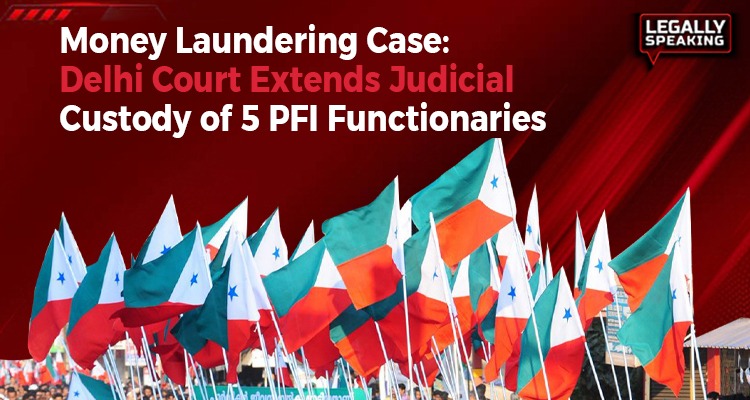
Delhi’s Patiala House Court on Thursday remanded five functionaries of the Popular Front of India (PFI) to 14 days of judicial custody following the Enforcement Directorate’s (ED) interrogation in connection with a money laundering case.
Vacation judge Chhavi Kapoor ordered the judicial custody for EM Abdul Rahiman, Anis Ahmad, Afsar Pasha, AS Ismail, and Md Shakif after the expiration of six days of ED custody. During the hearing, the court inquired about the evidence recovered during the custody remand.
ED’s Special Public Prosecutor (SPP), Manish Jain, informed the court that the accused were confronted with evidence obtained during raids and with the accused persons. The ED had arrested these five key functionaries on December 21, asserting their involvement in generating proceeds from crime for terrorist activities.
The accused, AS Ismail, Md. Shakif, Anis Ahmed, Afsar Paasha, and EM Abdul Rahiman, were initially arrested by the NIA under the sections of the Money Laundering Act and were later transferred to judicial custody. The ED sought a 10-day custodial remand on December 21, emphasizing the accused’s direct involvement in processes connected with the proceeds of crime.
Advocates Naveen Kumar Matta and Manish Jain, representing the ED, revealed during the hearing that PFI engaged in deceptive transactions to portray unaccounted cash as legitimate. They pointed out that PFI, with active members in Gulf countries, systematically raised substantial funds from abroad, utilizing hawala or underground channels.
Advocates Mohd Faizan and Ishaan Baisla also applied to the ED in this matter. The Popular Front of India had recently challenged the UAPA order in the Delhi High Court, but the Tribunal upheld the government’s decision to ban PFI and its affiliates. In March, Justice Dinesh Kumar Sharma dismissed the PFI’s allegations of government targeting a particular community, stating that the organization’s members were involved in secessionist activities contrary to the country’s social fabric.
The Central government, to justify the ban, presented 100 witnesses and two videos depicting the organization’s activities. In September of the previous year, the Ministry of Home Affairs declared PFI and its affiliates as an “Unlawful Association.” The statement cited serious offenses, including terrorism, financing terrorism, gruesome killings, and actions prejudicial to the country’s integrity, security, and sovereignty, leading to the declaration under the Unlawful Activities (Prevention) Act, 1967.




